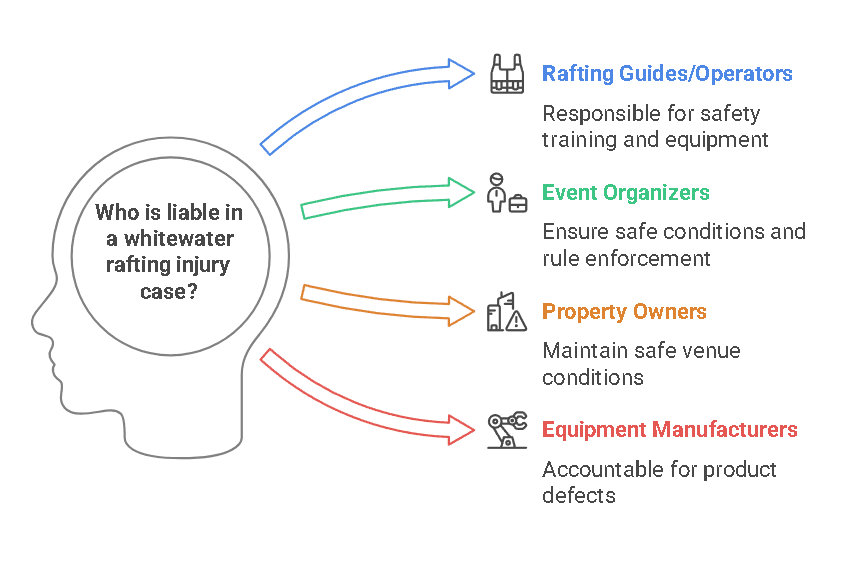Whitewater rafting combines adventure, skill, and a passion for the outdoors. This sport attracts thrill-seekers to navigate fast-moving rapids and challenging waterways. However, like many high-intensity sports, whitewater rafting carries inherent risks. Accidents can result in severe injuries, particularly during organized events, competitions, or group excursions.
If you or a loved one has suffered an injury during a whitewater rafting trip, our whitewater rafting injuries lawyer in Chicago is here to help. We focus on protecting the legal rights of accident victims, ensuring you receive the compensation necessary for recovery.
How Our Chicago Attorneys Build Strong Cases for Whitewater Rafting Injury Victims
Establishing liability in whitewater rafting injury cases can be challenging. These incidents often occur during organized tours or sports competitions involving multiple parties. At Chicago Injury Lawyer, we work diligently to identify those responsible for your injuries and hold them accountable. Here’s how we approach your case:
Comprehensive Investigations
Our experienced legal team thoroughly examines every aspect of your case. Did unsafe rafting equipment cause the accident? Did the guide or operator fail to provide proper safety instructions? Or were the rapids more hazardous than advertised? We leave no stone unturned in determining the cause of your injury.
Collecting Critical Evidence
Building a strong legal claim requires solid evidence. Our attorneys collaborate with medical professionals, water safety experts, and accident reconstruction specialists to establish the severity of your injury and pinpoint liability. This includes gathering eyewitness testimony, incident reports, and any available video footage.
Proving Negligence
Negligence in whitewater rafting injuries can arise from various sources, including poorly trained guides, unsafe rafting venues, or defective safety equipment. Whether your injury occurred during a recreational trip or a competitive event, our team works tirelessly to identify negligence and pursue justice on your behalf.
Maximizing Compensation
Our whitewater rafting injuries lawyer fights to secure the full compensation you’re entitled to. Whether negotiating with insurance companies or pursuing a lawsuit, our attorneys aim to achieve the best possible outcome for your case.
Common Types of Whitewater Rafting Injuries in Chicago
Whitewater rafting injuries can range from minor to life-threatening. Some of the most common injuries include:
Head Injuries and Concussions: The fast-paced nature of whitewater rafting makes head injuries a significant risk. Collisions with rocks, other participants, or the raft itself can lead to concussions, skull fractures, or long-term cognitive issues. These injuries often require immediate medical attention and ongoing treatment.
Drowning and Near-Drowning Incidents: While safety equipment like life vests reduces the risk, drowning remains a serious danger, especially during turbulent waters. Near-drowning incidents can also result in long-term complications, such as lung damage or brain injuries caused by oxygen deprivation.
Fractures and Broken Bones: High-speed collisions with rocks or capsizing rafts can lead to broken bones, particularly in the arms, legs, ribs, and collarbones. These injuries often require surgery, immobilization, and extensive rehabilitation.
Lacerations and Cuts: Sharp rocks, poorly maintained rafting equipment, or debris in the water can cause deep cuts and scrapes. Severe lacerations may lead to infections or require surgical intervention.
Spinal Cord Injuries: Falls or sudden impacts during a rafting trip can damage the spine, potentially resulting in paralysis or long-term mobility issues. These injuries often require costly medical care and extensive rehabilitation.
Sprains and Soft Tissue Injuries: The physical demands of whitewater rafting and unpredictable water movements can lead to sprains or strains in the shoulders, knees, or wrists. Though less severe, these injuries can cause significant pain and recovery time.

Recoverable Compensation for Whitewater Rafting Injuries
Whitewater rafting accidents can have serious physical, emotional, and financial consequences. Our personal injury lawyers work to ensure that you receive fair compensation for your damages, including:
- Medical Expenses: We ensure that all medical costs—from emergency care to long-term rehabilitation—are included in your claim.
- Lost Wages and Earning Capacity: If your injury temporarily or permanently affects your ability to work, we fight for compensation to cover lost income and reduced earning potential.
- Pain and Suffering: Injuries often come with significant physical and emotional pain. We pursue damages for your injury’s impact on your quality of life.
- Rehabilitation and Equipment Costs: Recovery may require ongoing physical therapy, adaptive equipment, or home modifications. We account for these costs in your claim.
- Loss of Enjoyment of Life: If your injury prevents you from participating in whitewater rafting competitions, outdoor events, or other activities you once loved, we seek compensation for this loss.
Illinois Legal Framework for Whitewater Rafting Injury Claims
Understanding Illinois law is crucial to building a successful case. Several statutes may apply to whitewater rafting injury claims, including:
Personal Injury Act
Under this law, individuals injured due to negligence can seek compensation. In Illinois, you generally have two years from the date of the injury to file a claim under the Personal Injury Act.
Product Liability Act
If your injury was caused by defective rafting equipment—such as life jackets, helmets, or rafts—you may file a product liability claim against the manufacturer or distributor. According to the Product Liability Act, the claim must be filed within two years of the accident.
Wrongful Death Act
If a loved one tragically loses their life in a rafting accident, the Wrongful Death Act allows family members to pursue compensation for funeral expenses, loss of companionship, and more. Claims must be filed within two years of the death.
Identifying Liable Parties in Whitewater Rafting Injury Cases
Determining liability is a key aspect of any whitewater rafting injury claim. Potentially responsible parties may include:
- Rafting Guides or Tour Operators
Guides and operators are responsible for ensuring the safety of participants. They could be held liable if they failed to provide adequate training, safety equipment, or supervision.
- Event or Competition Organizers
In organized events or tournaments, the organizers are responsible for maintaining safe conditions and enforcing rules. Negligence in these areas can lead to liability.
- Property Owners
The owners of the rafting venue must ensure safe conditions. Hazards such as poorly maintained facilities, lack of warning signs, or inadequate emergency protocols can result in liability.
- Equipment Manufacturers
Defective life vests, helmets, or rafts can lead to severe injuries. Illinois product liability laws hold manufacturers accountable for faulty products that cause harm.

Schedule a Free Consultation Today!
At Chicago Injury Lawyer, we are dedicated to helping victims of whitewater rafting accidents recover physically, emotionally, and financially. Contact us today for a free consultation. Our team of compassionate lawyers will evaluate your case, answer your questions, and guide you through every step of the legal process. We are ready to fight for the compensation you deserve. Reach out to our Chicago whitewater rafting injuries lawyer today to take the first step toward justice.
Frequently Asked Questions
1. What should I do after a whitewater rafting injury?
Seek medical attention immediately. Document your injuries with photos, collect witness information, and report the incident to the rafting operator or event organizer.
2. Can I file a claim if I signed a waiver?
Even if you signed a waiver, you may still have a claim if negligence, defective equipment, or unsafe conditions caused your injury.
3. How long do I have to file a rafting injuries claim?
In Illinois, you typically have two years from the date of the injury to file a personal injury claim.



